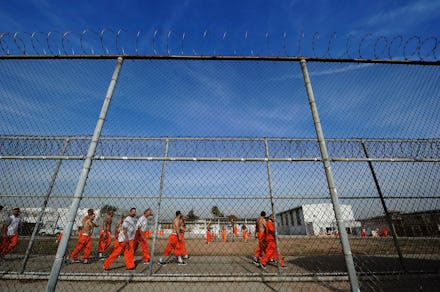One of America’s Biggest Banks Is Getting Into the Prison Business — But in a Good Way

It's not uncommon to hear "bankers" and "prison" in the same sentence, but this time it's for a different reason. Goldman Sachs is taking part in a $21 million plan to help a Boston nonprofit, Roca, keep young, at-risk men out of trouble. They've put $9 million toward the effort. If all goes well, though, they'll get it back.
Goldman is participating in a social impact bond (SIB), which is a new, innovative funding mechanism. In a SIB, the government enters into an agreement with an intermediary that raises money from independent investors; Goldman is one, in this case. If the project achieves its goals, the government repays the investors with returns based on the money it saved due to the program's success.
In Goldman's deal with Roca, if the young men the program targets spend 22% fewer days in jails and prisons than their peers, Massachusetts will have saved enough to pay Goldman back the $9 million.
"An even bigger drop in recidivism would hand Goldman as much as $1 million in profit. If Roca fails and too many men end up behind bars, Goldman will lose almost everything it ventured," Bloomberg wrote.
Here is how the state would be saving money: Each person that Roca keeps out of jail for a year saves Massachusetts $12,400. Without intervention, young men who are caught up in the criminal justice system have a 55% chance of re-incarceration within three years. Roca reduces that number to 37% by helping them gain competencies in life skills, education and employment. If Massachusetts can close a 300-person facility and not expand jail space, it could save $47,500 per person per year. (Image credit: Harvard Magazine)
One of the most appealing aspects of SIBs is that, if successful, they show that great financial returns and great social returns are not necessarily mutually exclusive. Sophisticated financial modeling and vast improvements in how the impact of social services are measured, monitored and evaluated have enabled us to monetize the value of doing the right thing.
Another smart feature of a SIB's design is that each party involved gets to do what it does best. Private players can innovate, while government can bring the project to scale and sustain it over time. And each player's strength is applied to the other sectors in valuable ways. As Bloomberg wrote, "Massachusetts' bond, the biggest of its sort, marks a shift for governments. Instead of using money to manage chronic challenges such as re-offending criminals, it seeks to prevent them with Wall Street-style risk analysis and numerical targets." If all goes well in a SIB, the result is that everyone wins. States receive societal benefits they otherwise might not have. Service-providing nonprofits get long-term funding and stability, and investors get the chance to do good (and be seen doing so).
Goldman is also making a statement with this move. They're showing they believe that troubled youth can get on a better path with proper resources that we, as a society, should pitch in to provide. These young men are not permanently flawed or doomed, and they can stay out of trouble with the right support. Goldman Sachs is banking on it.